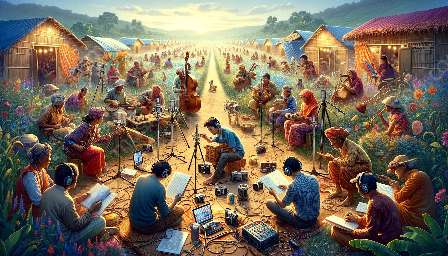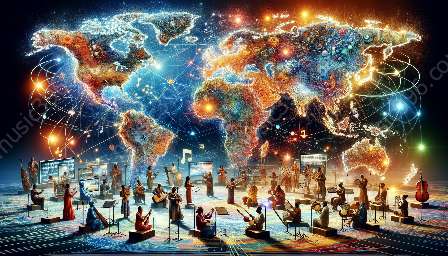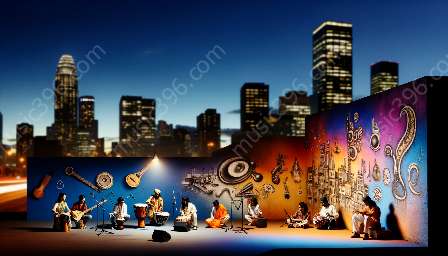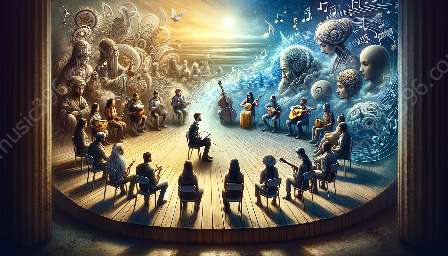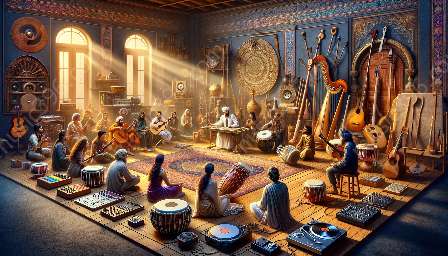Music has always been intricately tied to our sense of identity, serving as a powerful tool for cultural expression and preservation. When delving into the intersection of music and identity, it is essential to consider the impact of historical events on the development and evolution of musical expressions. In the realm of ethnomusicology, this relationship becomes even more profound, opening up avenues for exploration into how societies and individuals use music to navigate and communicate their identity within the context of historical and cultural shifts.
Understanding the Interplay of Music and Identity
Music serves as a mirror reflecting the values, beliefs, struggles, and triumphs of cultures and communities. It provides a platform for storytelling and serves as a reservoir of collective memories, often bearing the imprint of historical events and societal experiences. This symbiotic relationship between music and identity forms the basis of ethnomusicological inquiries, as scholars seek to unravel the complex threads that tie historical events to the musical expressions of identity.
Historical Events as Catalysts for Musical Evolution
Throughout history, pivotal events such as wars, revolutions, migrations, and colonization have significantly influenced the musical landscape of various cultures. These events have led to the fusion of diverse musical traditions, the emergence of new genres, and the preservation of traditional musical forms as markers of cultural resistance. For example, the African diaspora and the transatlantic slave trade gave birth to an array of musical genres like blues, jazz, and reggae, each carrying within them the struggles and resilience of individuals and communities impacted by historical injustices.
Musical Responses to Sociopolitical Changes
As societies grapple with sociopolitical changes brought about by historical events, music often becomes a tool for protest, solidarity, and cultural assertion. From the anti-war anthems of the 1960s to the hip-hop movement that emerged in response to urban socio-economic disparities, artists and musicians embed their lived experiences and societal upheavals into their music, crafting narratives of identity and resistance in the face of historical injustices.
Preservation and Reclamation of Cultural Identity
Amidst the turbulence of historical events, music acts as a vital medium for the preservation and reclamation of cultural identity. Indigenous communities, for instance, have harnessed music to revive traditional musical practices, amplifying their voices in the wake of colonial suppression. By tapping into their musical heritage, these communities reaffirm their unique cultural identities, holding onto their roots and ancestral knowledge despite the onslaught of historical upheavals.
Ethnomusicology: Unraveling the Dynamics
Ethnomusicology, as a discipline, delves deep into understanding the multifaceted relationship between music, identity, and historical events. By examining musical expressions within specific cultural contexts, ethnomusicologists dissect the intricate ways in which historical events shape musical narratives of identity. Through fieldwork, historical analysis, and critical interpretation, ethnomusicologists bridge the gap between past and present, unraveling the layers of meaning embedded within musical traditions.
Redefining Identity Through Music
Historical events not only shape musical expressions of identity but also contribute to the constant redefinition of cultural and individual identities. Ethnomusicologists explore how music becomes a site for negotiating complex identities in the wake of historical traumas, migration, and globalization. Whether through the reinterpretation of traditional songs or the creation of entirely new musical forms, individuals and communities mold their identities and assert their agency, thereby reshaping the narrative of history through music.
Musical Identity and Social Power Dynamics
One cannot discuss the intersection of music and identity without acknowledging the power dynamics at play. Historical events, often rooted in systems of oppression and marginalization, profoundly impact the construction of musical identity. Ethnomusicologists meticulously analyze how these power dynamics manifest in musical expressions, shedding light on the ways in which music becomes a site of resistance, negotiation, and subversion within historical contexts.
Legacy and Continuity in Musical Traditions
Through a historical lens, ethnomusicologists investigate how musical traditions endure and adapt across generations, carrying forward the legacies and narratives shaped by historical events. By documenting and contextualizing musical practices, ethnomusicology contributes to the preservation of cultural heritage while also acknowledging the dynamic nature of musical identity in response to historical transformations.
Conclusion
The relationship between historical events and musical expressions of identity is undeniably profound, weaving a complex tapestry of cultural narratives and individual experiences. Within the realm of ethnomusicology, this intersection serves as a rich terrain for scholarly exploration, inviting us to unravel the ways in which music becomes a vessel for resilience, protest, preservation, and negotiation amidst the ever-changing landscape of historical events. By acknowledging the enduring impact of history on musical identity, we gain a deeper understanding of the intricate connections between music, culture, and the human experience.


